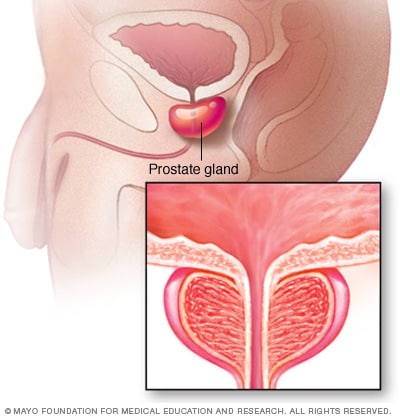Symptoms
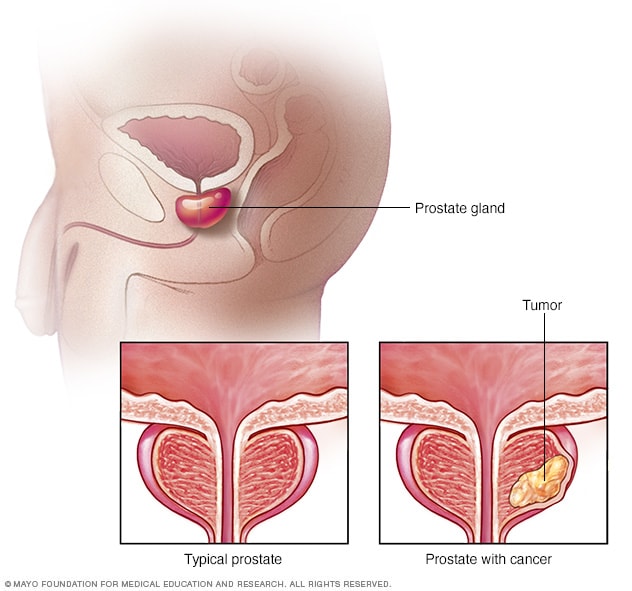
Prostate cancer may cause no signs or symptoms in its early stages.
Prostate cancer that’s more advanced may cause signs and symptoms such as:
- Trouble urinating
- Decreased force in the stream of urine
- Blood in the urine
- Blood in the semen
- Bone pain
- Losing weight without trying
- Erectile dysfunction
Causes
It’s not clear what causes prostate cancer.
Doctors know that prostate cancer begins when cells in the prostate develop changes in their DNA. A cell’s DNA contains the instructions that tell a cell what to do. The changes tell the cells to grow and divide more rapidly than normal cells do. The abnormal cells continue living, when other cells would die.
The accumulating abnormal cells form a tumor that can grow to invade nearby tissue. In time, some abnormal cells can break away and spread (metastasize) to other parts of the body.
Risk factors
Factors that can increase your risk of prostate cancer include:
- Older age
- Race
- Family history
- Obesity
Complications
Complications of prostate cancer and its treatments include:
- Cancer that spreads (metastasizes)
- Incontinence
- Erectile dysfunction
Prevention
You can reduce your risk of prostate cancer if you:
Choose a healthy diet full of fruits and vegetables.
- Choose healthy foods over supplements.
- Exercise most days of the week.
- Maintain a healthy weight.
Talk to your doctor about increased risk of prostate cancer.
Symptoms
Bladder cancer signs and symptoms may include:
- Blood in urine (hematuria), which may cause urine to appear bright red or cola colored, though sometimes the urine appears normal and blood is detected on a lab test
- Frequent urination
- Painful urination
- Back pain
Causes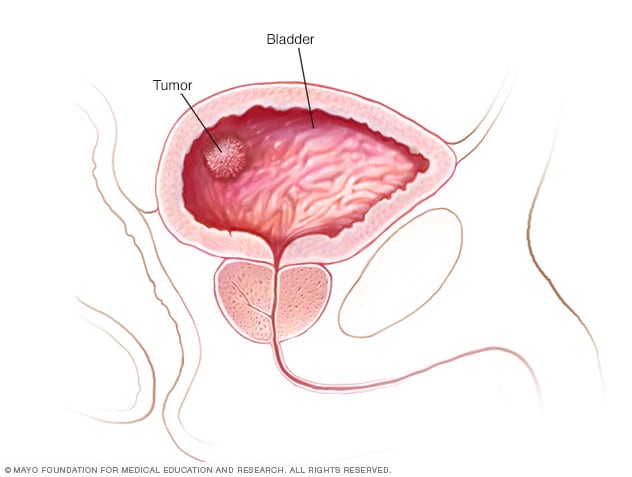
Risk factors
Factors that may increase bladder cancer risk include:
- Smoking
- Increasing age
- Being male
- Exposure to certain chemicals
- Previous cancer treatment
- Chronic bladder inflammation
- Personal or family history of cancer
Prevention
You can reduce your risk of prostate cancer if you:
Don’t smoke.
- Take caution around chemicals.
- Choose a variety of fruits and vegetables.
Symptoms
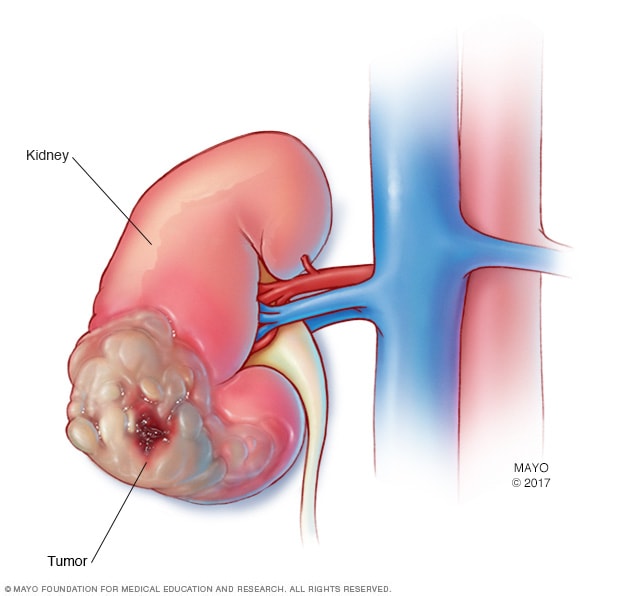
Kidney cancer usually doesn’t have signs or symptoms in its early stages. In time, signs and symptoms may develop, including:
- Blood in your urine, which may appear pink, red or cola colored
- Pain in your back or side that doesn’t go away
- Loss of appetite
- Unexplained weight loss
- Tiredness
- Fever
Causes
It’s not clear what causes most kidney cancers.
Doctors know that kidney cancer begins when some kidney cells develop changes (mutations) in their DNA. A cell’s DNA contains the instructions that tell a cell what to do. The changes tell the cells to grow and divide rapidly. The accumulating abnormal cells form a tumor that can extend beyond the kidney. Some cells can break off and spread (metastasize) to distant parts of the body.
Risk factors
Factors that can increase the risk of kidney cancer include:
- Older age
- Smoking
- Obesity
- High blood pressure (hypertension)
- Treatment for kidney failure
- Certain inherited syndromes
- Family history of kidney cancer
Prevention
Taking steps to improve your health may help reduce your risk of kidney cancer. To reduce your risk, try to:
- Quit smoking
- Maintain a healthy weight
- Control high blood pressure
Symptoms
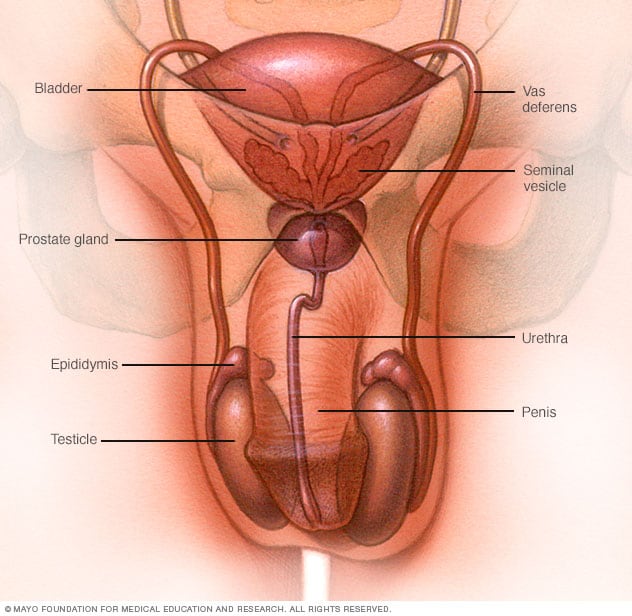
Signs and symptoms of testicular cancer include:
- A lump or enlargement in either testicle
- A feeling of heaviness in the scrotum
- A dull ache in the abdomen or groin
- A sudden collection of fluid in the scrotum
- Pain or discomfort in a testicle or the scrotum
- Enlargement or tenderness of the breasts
- Back pain
Causes
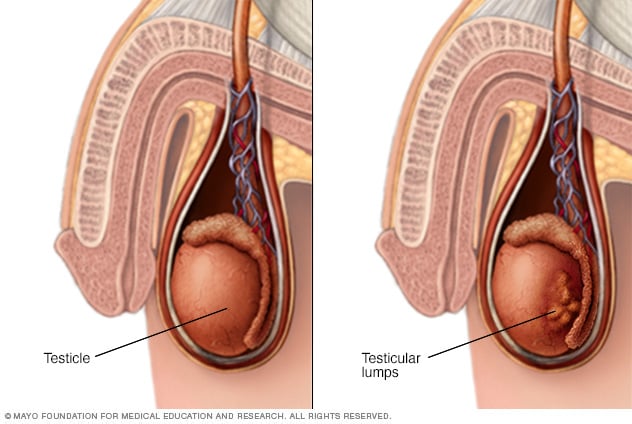
It’s not clear what causes testicular cancer in most cases.
Doctors know that testicular cancer occurs when healthy cells in a testicle become altered. Healthy cells grow and divide in an orderly way to keep your body functioning normally. But sometimes some cells develop abnormalities, causing this growth to get out of control — these cancer cells continue dividing even when new cells aren’t needed. The accumulating cells form a mass in the testicle.
Risk factors
Factors that may increase your risk of testicular cancer include:
An undescended testicle (cryptorchidism)
- Abnormal testicle development
- Family history
- Age
- Race
Prevention
There’s no way to prevent testicular cancer.
Some doctors recommend regular testicle self-examinations to identify testicular cancer at its earliest stage. But not all doctors agree. Discuss testicular self-examination with your doctor if you’re unsure about whether it’s right for you.
Symptoms
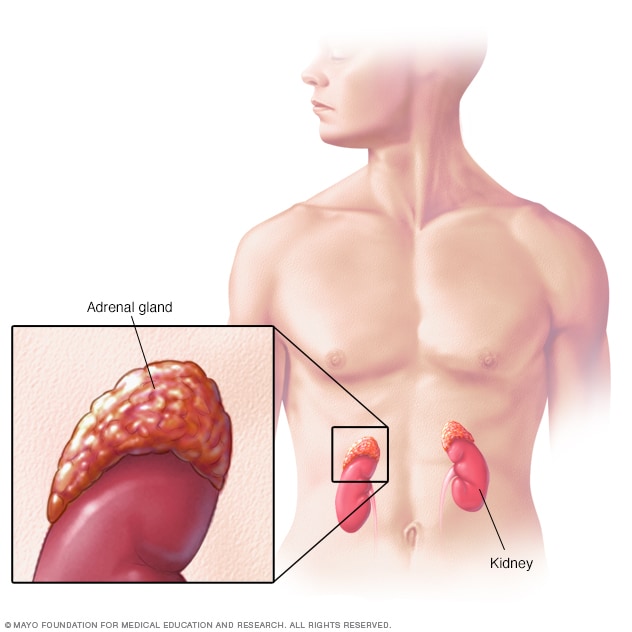
Signs and symptoms of adrenal cancer include:
- Weight gain
- Muscle weakness
- Pink or purple stretch marks on the skin
- Hormone changes in women that might cause excess facial hair, hair loss on the head and irregular periods
- Hormone changes in men that might cause enlarged breast tissue and shrinking testicles
- Nausea
- Vomiting
- Abdominal bloating
- Back pain
- Fever
- Loss of appetite
- Loss of weight without trying
Causes
It’s not clear what causes adrenal cancer.
Adrenal cancer forms when something creates changes (mutations) in the DNA of an adrenal gland cell. A cell’s DNA contains the instructions that tell a cell what to do. The mutations can tell the cell to multiply uncontrollably and to continue living when healthy cells would die. When this happens, the abnormal cells accumulate and form a tumor. The tumor cells can break away and spread (metastasize) to other parts of the body.
Risk factors
Adrenal cancer happens more often in people with inherited syndromes that increase the risk of certain cancers. These inherited syndromes include:
- Beckwith-Wiedemann syndrome
- Carney complex
- Li-Fraumeni syndrome
- Lynch syndrome
- Multiple endocrine neoplasia, type 1 (MEN 1)
Symptoms
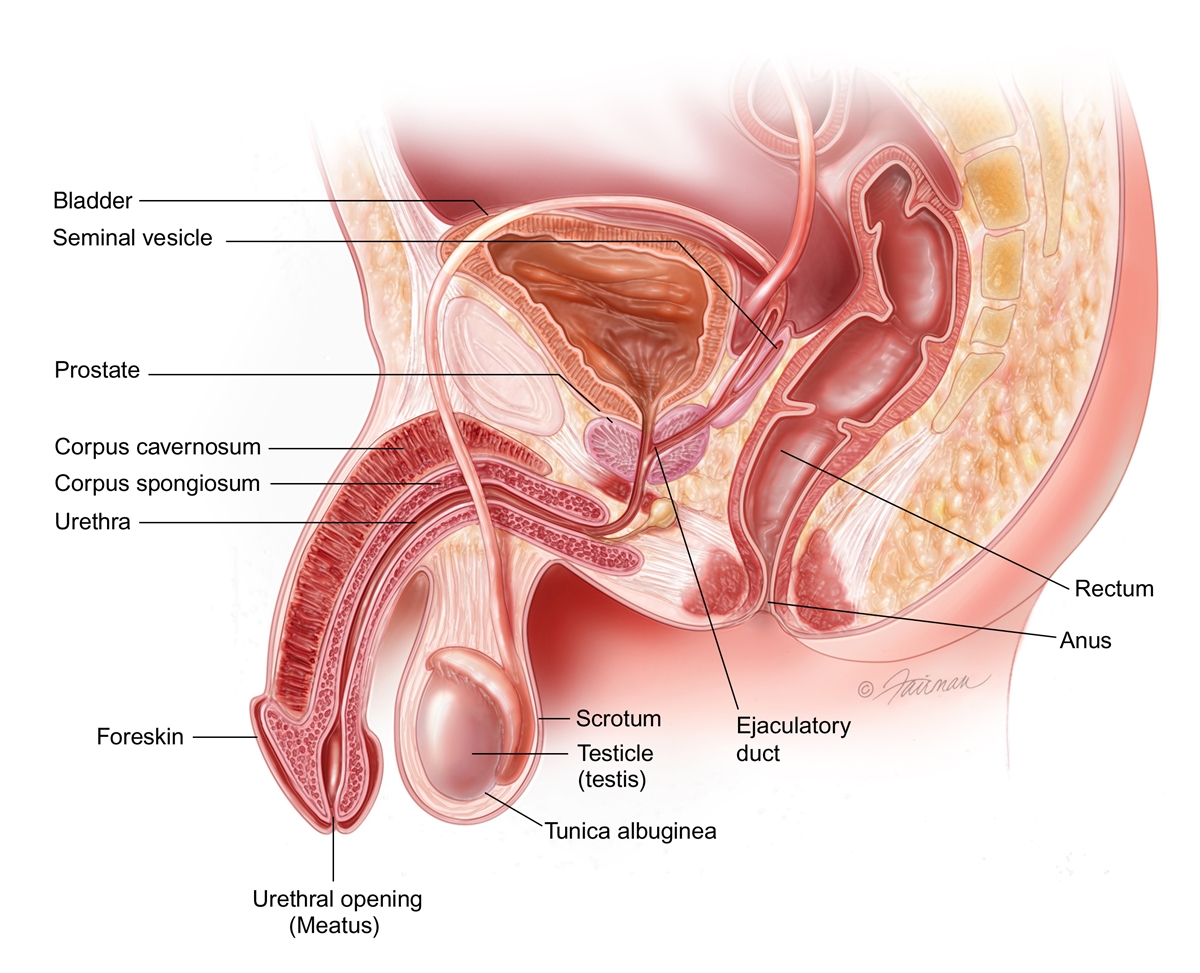
Signs and symptoms of penile cancer include:
- Changes in the way you ejaculate
- Abrupt changes in sexual desire
- Bleeding during urination or ejaculation
- Warts, bumps, lesions or a rash on your penis or in your genital area
- A severely bent penis or curvature that causes pain or interferes with sexual activity
- A burning sensation when you urinate
- Discharge from your penis
- Severe pain after trauma to your penis
Causes
- Erectile dysfunction
- Ejaculation problems
- Anorgasmia
- Decreased libido
- Sexually transmitted infections
- Yeast infection
- Peyronie’s disease
- Penile fracture
- Priapism
- Phimosis
- Paraphimosis
- Penile cancer
Risk factors
Adrenal cancer happens more often in people with inherited syndromes that increase the risk of certain cancers. These inherited syndromes include:
- Heart disease, diabetes and related conditions
- Certain medications
- Prostate cancer treatment
- Smoking
- Excessive drinking
- Hormone levels
- Psychological factors
- Neurological conditions
- Getting older
- Unsafe sex
- Piercings
Preventions
- Be sexually responsible
- Get vaccinated
- Stay physically active
- Make healthy choices
- Practice good hygiene
- Know your medications
- Pay attention to your mental health
- Stop smoking and limit the amount of alcohol you drink
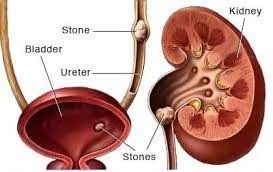
Kidney stones (also called renal calculi, nephrolithiasis or urolithiasis) are hard deposits made of minerals and salts that form inside your kidneys.
Passing kidney stones can be quite painful, but the stones usually cause no permanent damage if they’re recognized in a timely fashion.
Symptoms:
A kidney stone usually will not cause symptoms until it moves around within your kidney or passes into your ureters — the tubes connecting the kidneys and the bladder. If it becomes lodged in the ureters, it may block the flow of urine and cause the kidney to swell and the ureter to spasm, which can be very painful. At that point, you may experience these signs and symptoms:
- Severe, sharp pain in the side and back, below the ribs
- Pain that radiates to the lower abdomen and groin
- Pain that comes in waves and fluctuates in intensity
- Pain or burning sensation while urinating
- Pink, red or brown urine
- Cloudy or foul-smelling urine
- A persistent need to urinate, urinating more often than usual or urinating in small amounts
- Nausea and vomiting
- Fever and chills if an infection is present
Risk factors:
- Family or personal history. If someone in your family has had kidney stones, you’re more likely to develop stones, too. If you’ve already had one or more kidney stones, you’re at increased risk of developing another
- Dehydration. Not drinking enough water each day can increase your risk of kidney stones. People who live in warm, dry climates and those who sweat a lot may be at higher risk than others
- Certain diets. Eating a diet that’s high in protein, sodium (salt) and sugar may increase your risk of some types of kidney stones. This is especially true with a high-sodium diet. Too much salt in your diet increases the amount of calcium your kidneys must filter and significantly increases your risk of kidney stones
- Obesity. High body mass index (BMI), large waist size and weight gain have been linked to an increased risk of kidney stones
- Digestive diseases and surgery. Gastric bypass surgery, inflammatory bowel disease or chronic diarrhea can cause changes in the digestive process that affect your absorption of calcium and water, increasing the amounts of stone-forming substances in your urine
- Other medical conditions such as renal tubular acidosis, cystinuria, hyperparathyroidism and repeated urinary tract infections also can increase your risk of kidney stones
- Certain supplements and medications, such as vitamin C, dietary supplements, laxatives (when used excessively), calcium-based antacids, and certain medications used to treat migraines or depression, can increase your risk of kidney stones
Treatment:
Treatment for kidney stones varies, depending on the type of stone and the cause.
Small stones with minimal symptoms:
- Drinking water
- Pain relievers
- Medical therapy: alpha blockers include tamsulosin
Large stones and those that cause symptoms:
- Using sound waves to break up stones: extracorporeal shock wave lithotripsy (ESWL)
- Surgery to remove very large stones in the kidney
- A procedure called percutaneous nephrolithotomy involves surgically removing a kidney stone using small telescopes and instruments inserted through a small incision in your back
- To remove a smaller stone in your ureter or kidney, your doctor may pass ureteroscope to your ureter through the urinary passage and break the stone into pieces that will pass in your urine
- Parathyroid gland surgery
Prevention:
- Drink water throughout the day
- Eat fewer oxalate-rich foods
- Choose a diet low in salt and animal protein
- Continue eating calcium-rich foods, but use caution with calcium supplements
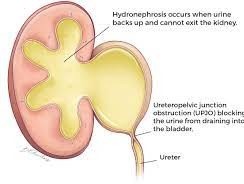
A blockage in the kidney’s renal pelvis (upper end of the ureter) is called a ureteropelvic junction (UPJ) obstruction. Blocking urine flow can damage the kidney.
It is responsible for about 80% of all swollen urine-collecting systems. Males are affected at more than double the rate of females, and the left kidney is affected about twice as often as the right.
Symptoms:
- Lump in the abdomen
- Urinary tract infection with fever
- Pain in the upper abdomen or back, usually after drinking fluids. In some cases, pain may come and go because the blockage isn’t complete, allowing urine to flow at times. In other instances, blockage may occur only when the person is standing upright but not when lying down
- Kidney stones
- Blood in the urine
- Vomiting
- Poor growth in an infant
Causes:
Most UPJ obstructions are present at birth, an indication that structures of the ureter or kidney did not form correctly as the fetus was developing.
In some cases an inherited tendency to obstructions will run in a family, but usually an obstruction appears in just a single family member.
A number of different types of obstructions may be present at birth, such as:
- The opening of the ureter is too narrow
- There are mistakes in the number or arrangement of small-muscle cells in the ureter. These cells are responsible for the muscular contractions that push urine from the kidney down to the bladder
- Unusual folds in the walls of the ureter may act as valves
- Twists may form along the path of the ureter
- The ureter connects to the renal pelvis in too high a position, creating an abnormal angle between the ureter and kidney
- An abnormal crossing of blood vessels can press on or distort the UPJ
- Less frequently, UPJ obstructions may form in adults as a result of kidney stones, upper urinary tract infections, surgery, an abnormally crossing blood vessel or swelling in the urinary tract
Treatment:
In many infants with UPJ obstruction, the condition may improve on its own within the first 18 months of life. During this time, repeated ultrasounds and scans are used to monitor the condition to make sure it will not cause lasting harm.
If urine flow doesn’t improve and the obstruction remains after the first 18 months of life, surgery is usually needed to fix the problem [Pyeloplasty]
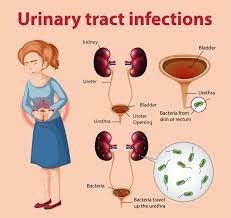
- Infection in any part of your urinary system — your kidneys, ureters, bladder and urethra
- Most infections involve the lower urinary tract — the bladder and the urethra
Causes:
- Although the urinary system is designed to keep out microscopic invaders, these defenses sometimes fail. When that happens, bacteria may take hold and grow into a full-blown infection in the urinary tract.
- The most common UTIs occur mainly in women and affect the bladder and urethra
Infection of the bladder (cystitis)
- Escherichia coli (E. coli), a type of bacteria commonly found in the gastrointestinal (GI) tract
- Sexual intercourse may lead to cystitis
- Female anatomy, the short distance from the urethra to the anus and the urethral opening to the bladder
Infection of the urethra (urethritis)
- When bacteria spread from the anus to the urethra
- Sexual intercourse may lead to cystitis
- Sexually transmitted infections, such as herpes, gonorrhea, chlamydia and mycoplasma, can cause urethritis
Symptoms:
- A strong, persistent urge to urinate
- A burning sensation when urinating
- Passing frequent, small amounts of urine
- Urine that appears cloudy
- Urine that appears red, bright pink or cola-colored — a sign of blood in the urine
- Strong-smelling urine
- Pelvic pain, in women — especially in the center of the pelvis and around the area of the pubic bone
Complications:
- Recurrent infections, especially in women who experience two or more UTIs in a six-month period or four or more within a year
- Permanent kidney damage from an acute or chronic kidney infection (pyelonephritis) due to an untreated UTI
- Increased risk in pregnant women of delivering low birth weight or premature infants
- Urethral narrowing (stricture) in men from recurrent urethritis, previously seen with gonococcal urethritis
- Sepsis, a potentially life-threatening complication of an infection, especially if the infection works its way up your urinary tract to your kidneys
Risk factors:
- Female anatomy
- Sexual activity
- Certain types of birth control
- Menopause
- Urinary tract abnormalities
- Blockages in the urinary tract
- A suppressed immune system
- Catheter use
- A recent urinary procedure
Prevention:
- Drink plenty of liquids, especially water Drinking water helps dilute your urine and ensures that you’ll urinate more frequently — allowing bacteria to be flushed from your urinary tract before an infection can begin.
- Drink cranberry juiceAlthough studies are not conclusive that cranberry juice prevents UTIs, it is likely not harmful.
- Wipe from front to backDoing so after urinating and after a bowel movement helps prevent bacteria in the anal region from spreading to the vagina and urethra.
- Empty your bladder soon after intercourse Also, drink a full glass of water to help flush bacteria.
- Avoid potentially irritating feminine productsUsing deodorant sprays or other feminine products, such as douches and powders, in the genital area can irritate the urethra.
- Change your birth control methodDiaphragms, or unlubricated or spermicide-treated condoms, can all contribute to bacterial growth.
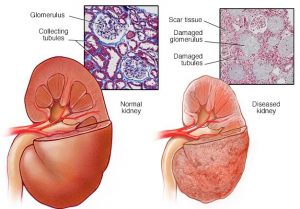
- Gradual loss of kidney function
- Your kidneys filter wastes and excess fluids from your blood, which are then excreted in your urine. When chronic kidney disease reaches an advanced stage, dangerous levels of fluid, electrolytes and wastes can build up in your body
- Chronic kidney disease can progress to end-stage kidney failure, which is fatal without artificial filtering (dialysis) or a kidney transplant.
Causes:
- Type 1 or type 2 diabetes
- High blood pressure
- Glomerulonephritis, an inflammation of the kidney’s filtering units (glomeruli)
- Interstitial nephritis, an inflammation of the kidney’s tubules and surrounding structures
- Polycystic kidney disease
- Prolonged obstruction of the urinary tract, from conditions such as enlarged prostate, kidney stones and some cancers
- Vesicoureteral reflux, a condition that causes urine to back up into your kidneys
- Recurrent kidney infection, also called pyelonephritis
Symptoms:
- Nausea
- Vomiting
- Loss of appetite
- Fatigue and weakness
- Sleep problems
- Changes in how much you urinate
- Decreased mental sharpness
- Muscle twitches and cramps
- Swelling of feet and ankles
- Persistent itching
- Chest pain, if fluid builds up around the lining of the heart
- Shortness of breath, if fluid builds up in the lungs
- High blood pressure (hypertension) that’s difficult to control
Complications:
- Fluid retention, which could lead to swelling in your arms and legs, high blood pressure, or fluid in your lungs (pulmonary edema)
- A sudden rise in potassium levels in your blood (hyperkalemia), which could impair your heart’s ability to function and may be life-threatening
- Heart and blood vessel (cardiovascular) disease
- Weak bones and an increased risk of bone fractures
- Anemia
- Decreased sex drive, erectile dysfunction or reduced fertility
- Damage to your central nervous system, which can cause difficulty concentrating, personality changes or seizures
- Decreased immune response, which makes you more vulnerable to infection
- Pericarditis, an inflammation of the saclike membrane that envelops your heart (pericardium)
- Pregnancy complications that carry risks for the mother and the developing fetus
- Irreversible damage to your kidneys (end-stage kidney disease), eventually requiring either dialysis or a kidney transplant for survival
Prevention:
- Follow instructions on over-the-counter medications
- Maintain a healthy weight
- Don’t smoke
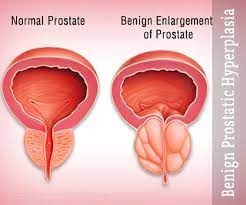
Benign prostatic enlargement — also called prostate gland enlargement — is a common condition as men get older.
Symptoms:
- Frequent or urgent need to urinate
- Increased frequency of urination at night (nocturia)
- Difficulty starting urination
- Weak urine stream or a stream that stops and starts
- Dribbling at the end of urination
- Inability to completely empty the bladder
- Urinary tract infection
- Inability to urinate
- Blood in the urine
The size of your prostate doesn’t necessarily determine the severity of your symptoms. Some men with only slightly enlarged prostates can have significant symptoms, while other men with very enlarged prostates can have only minor urinary symptoms.
Risk factors:
- Aging:About one-third of men experience moderate to severe symptoms by age 60, and about half do so by age 80.
- Family history.
- Diabetes and heart disease.
- Lifestyle: Obesity
Complications:
- Sudden inability to urinate (urinary retention).
- Urinary tract infections (UTIs).
- Bladder stones.
- Bladder damage.
- Kidney damage.
Treatment:
- Medications
Alpha blockers.
5-alpha reductase inhibitors
Combination drug therapy.
Tadalafil
- Transurethral resection of the prostate (TURP)
- Transurethral incision of the prostate (TUIP)
- Transurethral microwave thermotherapy (TUMT).
- Transurethral needle ablation (TUNA)
- Laser therapy
- photoselective vaporization of the prostate (PVP) and holmium laser ablation of the prostate (HoLAP).
- holmium laser enucleation of the prostate (HoLEP)
- Prostatic urethral lift (PUL)
- Embolization
- Open or robot-assisted prostatectomy
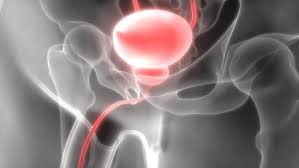
- Symptoms related to problems with your lower urinary tract: bladder, prostate and urethra
- LUTS are broadly grouped into symptoms to do with storing or passing urine. You might have symptoms linked mainly to one or the other, or a combination of both.
Symptoms:
- Hesitancy – a longer than usual wait for the stream of urine to begin
- Weak stream
- Straining to urinate
- Dribbling after urination has finished
- A stream that stops and starts
- Feeling an urgent need to urinate
- A short period of time between the urges to urinate
- Waking from sleep to pass urine two or more times a night
- A sudden, intense urge to urinate, followed by urinating without control
Causes:
- Urinary tract infection, or an infection and inflammation of the prostate gland (prostatitis)
- Overactive bladder
- Underlying chronic medical condition, such as obesity, diabetes, high blood pressure, or obstructive sleep apnoea
- Smoking
- Drinking fluids late at night, having too much alcohol or caffeine, or low levels of physical activity
- Difficult to pass urine may be due to enlarged prostate gland, or scarring of your urethra (the tube that carries your urine from the bladder to the tip of the penis
- Some medicines, and diseases such as stroke and Parkinson’s disease
- LUTS is also linked with depression and erectile dysfunction. It’s common to have a number of things that are causing LUTS, so it’s not always easy for doctors to find the exact cause
Prevention:
- Healthy lifestyle and body weight
- Quit smoking
- Treatment of medical conditions such as diabetes, high blood pressure or sleep apnoea
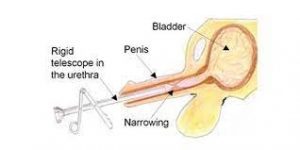
Urethral stricture is a narrowing of the urethra. Your urethra is the tube that carries urine from the bladder through the penis and out during urination.
Causes:
- An injury to your penis or scrotum or a straddle injury to the scrotum or perineum
- An infection, most often sexually transmitted diseases like chlamydia
- Placement of catheters or instruments into the urethra during surgery or procedures
Symptoms:
- Straining to urinate
- Pain during urination
- Urinary tract infection
- Prostatitis
- Retention of urine
Tests:
- Uroflowmetry
- Retrograde urethrogram
- Urinary tract infection
- Cystoscopy
Treatment:
- Urethral dilation
- Internal urethrotomy
- Urethral reconstruction
Symptoms

Prostate cancer may cause no signs or symptoms in its early stages.
Prostate cancer that’s more advanced may cause signs and symptoms such as:
- Trouble urinating
- Decreased force in the stream of urine
- Blood in the urine
- Blood in the semen
- Bone pain
- Losing weight without trying
- Erectile dysfunction
Causes
It’s not clear what causes prostate cancer.
Doctors know that prostate cancer begins when cells in the prostate develop changes in their DNA. A cell’s DNA contains the instructions that tell a cell what to do. The changes tell the cells to grow and divide more rapidly than normal cells do. The abnormal cells continue living, when other cells would die.
The accumulating abnormal cells form a tumor that can grow to invade nearby tissue. In time, some abnormal cells can break away and spread (metastasize) to other parts of the body.
Risk factors
Factors that can increase your risk of prostate cancer include:
- Older age
- Race
- Family history
- Obesity
Complications
Complications of prostate cancer and its treatments include:
- Cancer that spreads (metastasizes)
- Incontinence
- Erectile dysfunction
Prevention
You can reduce your risk of prostate cancer if you:
Choose a healthy diet full of fruits and vegetables.
- Choose healthy foods over supplements.
- Exercise most days of the week.
- Maintain a healthy weight.
Talk to your doctor about increased risk of prostate cancer.
Symptoms
Bladder cancer signs and symptoms may include:
- Blood in urine (hematuria), which may cause urine to appear bright red or cola colored, though sometimes the urine appears normal and blood is detected on a lab test
- Frequent urination
- Painful urination
- Back pain
Causes
Risk factors
Factors that may increase bladder cancer risk include:
- Smoking
- Increasing age
- Being male
- Exposure to certain chemicals
- Previous cancer treatment
- Chronic bladder inflammation
- Personal or family history of cancer
Prevention
You can reduce your risk of prostate cancer if you:
Don’t smoke.
- Take caution around chemicals.
- Choose a variety of fruits and vegetables.
Symptoms

Kidney cancer usually doesn’t have signs or symptoms in its early stages. In time, signs and symptoms may develop, including:
- Blood in your urine, which may appear pink, red or cola colored
- Pain in your back or side that doesn’t go away
- Loss of appetite
- Unexplained weight loss
- Tiredness
- Fever
Causes
It’s not clear what causes most kidney cancers.
Doctors know that kidney cancer begins when some kidney cells develop changes (mutations) in their DNA. A cell’s DNA contains the instructions that tell a cell what to do. The changes tell the cells to grow and divide rapidly. The accumulating abnormal cells form a tumor that can extend beyond the kidney. Some cells can break off and spread (metastasize) to distant parts of the body.
Risk factors
Factors that can increase the risk of kidney cancer include:
- Older age
- Smoking
- Obesity
- High blood pressure (hypertension)
- Treatment for kidney failure
- Certain inherited syndromes
- Family history of kidney cancer
Prevention
Taking steps to improve your health may help reduce your risk of kidney cancer. To reduce your risk, try to:
- Quit smoking
- Maintain a healthy weight
- Control high blood pressure
Symptoms

Signs and symptoms of testicular cancer include:
- A lump or enlargement in either testicle
- A feeling of heaviness in the scrotum
- A dull ache in the abdomen or groin
- A sudden collection of fluid in the scrotum
- Pain or discomfort in a testicle or the scrotum
- Enlargement or tenderness of the breasts
- Back pain
Causes

It’s not clear what causes testicular cancer in most cases.
Doctors know that testicular cancer occurs when healthy cells in a testicle become altered. Healthy cells grow and divide in an orderly way to keep your body functioning normally. But sometimes some cells develop abnormalities, causing this growth to get out of control — these cancer cells continue dividing even when new cells aren’t needed. The accumulating cells form a mass in the testicle.
Risk factors
Factors that may increase your risk of testicular cancer include:
An undescended testicle (cryptorchidism)
- Abnormal testicle development
- Family history
- Age
- Race
Prevention
There’s no way to prevent testicular cancer.
Some doctors recommend regular testicle self-examinations to identify testicular cancer at its earliest stage. But not all doctors agree. Discuss testicular self-examination with your doctor if you’re unsure about whether it’s right for you.
Symptoms

Signs and symptoms of adrenal cancer include:
- Weight gain
- Muscle weakness
- Pink or purple stretch marks on the skin
- Hormone changes in women that might cause excess facial hair, hair loss on the head and irregular periods
- Hormone changes in men that might cause enlarged breast tissue and shrinking testicles
- Nausea
- Vomiting
- Abdominal bloating
- Back pain
- Fever
- Loss of appetite
- Loss of weight without trying
Causes
It’s not clear what causes adrenal cancer.
Adrenal cancer forms when something creates changes (mutations) in the DNA of an adrenal gland cell. A cell’s DNA contains the instructions that tell a cell what to do. The mutations can tell the cell to multiply uncontrollably and to continue living when healthy cells would die. When this happens, the abnormal cells accumulate and form a tumor. The tumor cells can break away and spread (metastasize) to other parts of the body.
Risk factors
Adrenal cancer happens more often in people with inherited syndromes that increase the risk of certain cancers. These inherited syndromes include:
- Beckwith-Wiedemann syndrome
- Carney complex
- Li-Fraumeni syndrome
- Lynch syndrome
- Multiple endocrine neoplasia, type 1 (MEN 1)
Symptoms

Signs and symptoms of penile cancer include:
- Changes in the way you ejaculate
- Abrupt changes in sexual desire
- Bleeding during urination or ejaculation
- Warts, bumps, lesions or a rash on your penis or in your genital area
- A severely bent penis or curvature that causes pain or interferes with sexual activity
- A burning sensation when you urinate
- Discharge from your penis
- Severe pain after trauma to your penis
Causes
- Erectile dysfunction
- Ejaculation problems
- Anorgasmia
- Decreased libido
- Sexually transmitted infections
- Yeast infection
- Peyronie’s disease
- Penile fracture
- Priapism
- Phimosis
- Paraphimosis
- Penile cancer
Risk factors
Adrenal cancer happens more often in people with inherited syndromes that increase the risk of certain cancers. These inherited syndromes include:
- Heart disease, diabetes and related conditions
- Certain medications
- Prostate cancer treatment
- Smoking
- Excessive drinking
- Hormone levels
- Psychological factors
- Neurological conditions
- Getting older
- Unsafe sex
- Piercings
Preventions
- Be sexually responsible
- Get vaccinated
- Stay physically active
- Make healthy choices
- Practice good hygiene
- Know your medications
- Pay attention to your mental health
- Stop smoking and limit the amount of alcohol you drink
Symptoms

Signs and symptoms of penile cancer include:
- Changes in the way you ejaculate
- Abrupt changes in sexual desire
- Bleeding during urination or ejaculation
- Warts, bumps, lesions or a rash on your penis or in your genital area
- A severely bent penis or curvature that causes pain or interferes with sexual activity
- A burning sensation when you urinate
- Discharge from your penis
- Severe pain after trauma to your penis
Causes
- Erectile dysfunction
- Ejaculation problems
- Anorgasmia
- Decreased libido
- Sexually transmitted infections
- Yeast infection
- Peyronie’s disease
- Penile fracture
- Priapism
- Phimosis
- Paraphimosis
- Penile cancer
Risk factors
Adrenal cancer happens more often in people with inherited syndromes that increase the risk of certain cancers. These inherited syndromes include:
- Heart disease, diabetes and related conditions
- Certain medications
- Prostate cancer treatment
- Smoking
- Excessive drinking
- Hormone levels
- Psychological factors
- Neurological conditions
- Getting older
- Unsafe sex
- Piercings
Preventions
- Be sexually responsible
- Get vaccinated
- Stay physically active
- Make healthy choices
- Practice good hygiene
- Know your medications
- Pay attention to your mental health
- Stop smoking and limit the amount of alcohol you drink
Symptoms
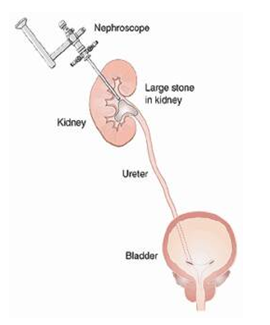
Most infants (less than 1 year) are asymptomatic and most children are discovered because of their symptoms. Symptoms suggesting PUJO include hematuria (blood in the urine), urinary tract infection(UTI), kidney stones, failure to thrive, pain associated with nausea and vomiting, abdominal fullness/palpable mass or hypertension.
Causes
Most often PUJO is congenital (present from birth), usually because of an abnormality in the development of the muscle surrounding the PUJ. PUJO can also occur later in life and can be caused by other factors, including compression of the ureter by abnormal blood vessels, inflammation, stones, or scar tissue.
Complications
If left untreated, PUJ obstruction can lead to progressive loss of kidney function, kidney stones or infection.
Symptoms
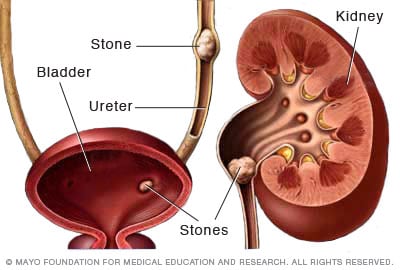
A kidney stone usually will not cause symptoms until it moves around within your kidney or passes into your ureters — the tubes connecting the kidneys and the bladder.
- Severe, sharp pain in the side and back, below the ribs
- Pain that radiates to the lower abdomen and groin
- Pain that comes in waves and fluctuates in intensity
- Pain or burning sensation while urinating
Other signs and symptoms may include:
- Pink, red or brown urine
- Cloudy or foul-smelling urine
- A persistent need to urinate, urinating more often than usual or urinating in small amounts
- Nausea and vomiting
- Fever and chills if an infection is present
Causes
Kidney stones often have no definite, single cause, although several factors may increase your risk.
Kidney stones form when your urine contains more crystal-forming substances — such as calcium, oxalate and uric acid — than the fluid in your urine can dilute. At the same time, your urine may lack substances that prevent crystals from sticking together, creating an ideal environment for kidney stones to form.
Risk factors
Factors that increase your risk of developing kidney stones include:
- Family or personal history
- Dehydration
- Certain diets
- Obesity
- Digestive diseases and surgery
- Other medical conditions
- Certain supplements and medications
Symptoms
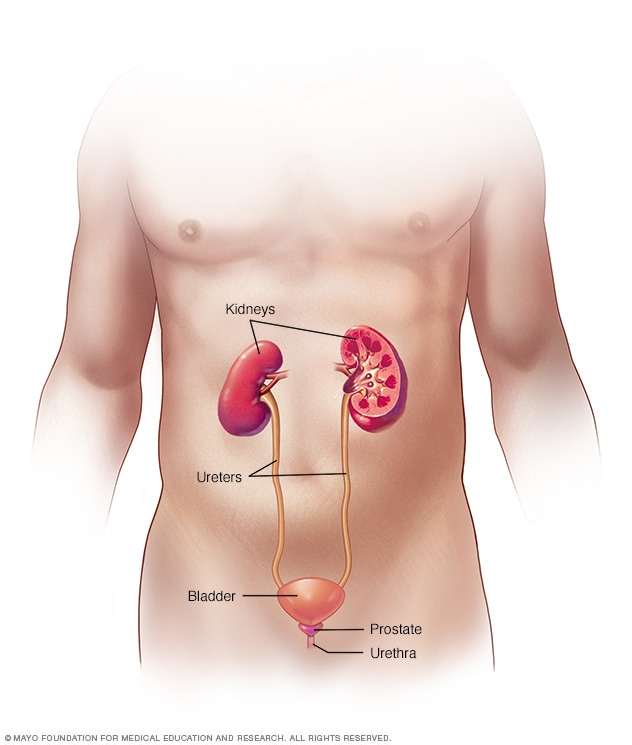
Urinary tract infections don’t always cause signs and symptoms, but when they do they may include:
- A strong, persistent urge to urinate
- A burning sensation when urinating
- Passing frequent, small amounts of urine
- Urine that appears cloudy
- Urine that appears red, bright pink or cola-colored — a sign of blood in the urine
- Strong-smelling urine
- Pelvic pain, in women — especially in the center of the pelvis and around the area of the pubic bone
Causes
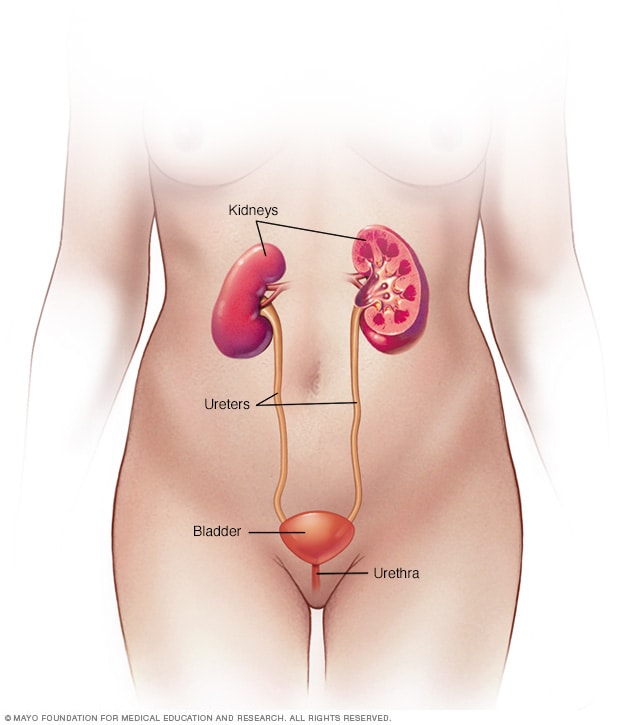
Urinary tract infections typically occur when bacteria enter the urinary tract through the urethra and begin to multiply in the bladder. Although the urinary system is designed to keep out such microscopic invaders, these defenses sometimes fail. When that happens, bacteria may take hold and grow into a full-blown infection in the urinary tract.
Risk factors
- Female anatomy
- Sexual activity
- Certain types of birth control
- Menopause
Complications
When treated promptly and properly, lower urinary tract infections rarely lead to complications. But left untreated, a urinary tract infection can have serious consequences.
Prevention
You can take these steps to reduce your risk of urinary tract infections:
- Drink plenty of liquids, especially water.
- Drink cranberry juice.
- Wipe from front to back
- Empty your bladder soon after intercourse.
- Avoid potentially irritating feminine products.
- Change your birth control method.
Symptoms
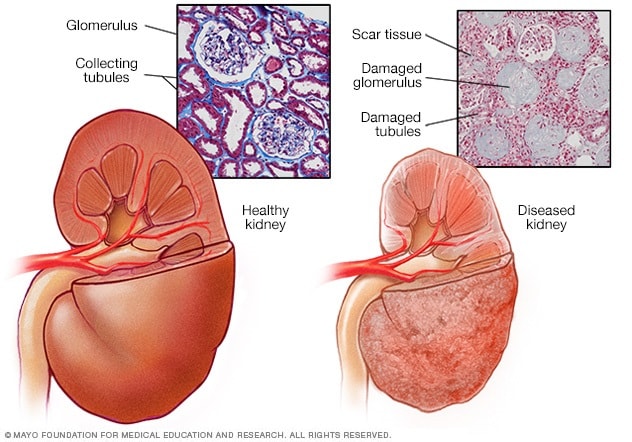
Signs and symptoms of chronic kidney disease develop over time if kidney damage progresses slowly. Signs and symptoms of kidney disease may include:
- Nausea
- Vomiting
- Loss of appetite
- Fatigue and weakness
- Sleep problems
- Changes in how much you urinate
- Decreased mental sharpness
- Muscle twitches and cramps
- Swelling of feet and ankles
- Persistent itching
- Chest pain, if fluid builds up around the lining of the heart
- Shortness of breath, if fluid builds up in the lungs
- High blood pressure (hypertension) that’s difficult to control
Causes
Chronic kidney disease occurs when a disease or condition impairs kidney function, causing kidney damage to worsen over several months or years.
Risk factors
Factors that may increase your risk of chronic kidney disease include:
- Diabetes
- High blood pressure
- Heart and blood vessel (cardiovascular) disease
- Smoking
- Obesity
- Being African-American, Native American or Asian-American
- Family history of kidney disease
- Abnormal kidney structure
- Older age
Complications
Chronic kidney disease can affect almost every part of your body. Potential complications may include:
- Fluid retention, which could lead to swelling in your arms and legs, high blood pressure, or fluid in your lungs (pulmonary edema)
- A sudden rise in potassium levels in your blood (hyperkalemia), which could impair your heart’s ability to function and may be life-threatening
- Heart and blood vessel (cardiovascular) disease
- Weak bones and an increased risk of bone fractures
- Anemia
Prevention
To reduce your risk of developing kidney disease:
- Follow instructions on over-the-counter medications.
- Maintain a healthy weight.
- Don’t smoke.
- Manage your medical conditions with your doctor’s help.
Symptoms
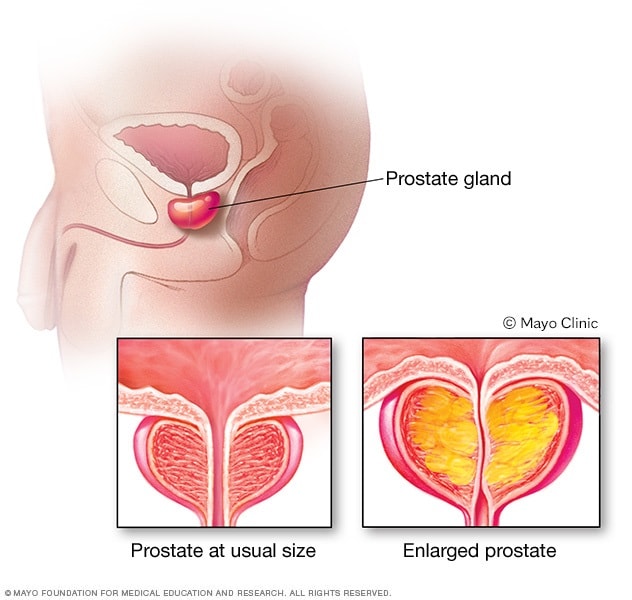
The severity of symptoms in people who have prostate gland enlargement varies, but symptoms tend to gradually worsen over time. Common signs and symptoms of BPH include:
- Frequent or urgent need to urinate
- Increased frequency of urination at night (nocturia)
- Difficulty starting urination
- Weak urine stream or a stream that stops and starts
- Dribbling at the end of urination
- Inability to completely empty the bladder
Less common signs and symptoms include:
- Urinary tract infection
- Inability to urinate
- Blood in the urine
Causes
The prostate gland is located beneath your bladder. The tube that transports urine from the bladder out of your penis (urethra) passes through the center of the prostate. When the prostate enlarges, it begins to block urine flow.
Risk factors
Risk factors for prostate gland enlargement include:
- Aging
- Family history
- Diabetes and heart disease
- Lifestyle
Complications
Complications of an enlarged prostate can include:
- Sudden inability to urinate (urinary retention)
- Urinary tract infections (UTIs)
- Bladder stones
- Bladder damage
- Kidney damage
Symptoms
Hesitancy – a longer than usual wait for the stream of urine to begin
Weak stream
Straining to urinate
Dribbling after urination has finished
A stream that stops and starts
Feeling an urgent need to urinate
A short period of time between the urges to urinate
Waking from sleep to pass urine two or more times a night
A sudden, intense urge to urinate, followed by urinating without control.
Causes
If it’s painful for you to urinate, your LUTS might be caused by a urinary tract infection, or an infection and inflammation of the prostate gland (prostatitis). But your symptoms might also be because of an overactive bladder.
This type of LUTS might mean that you have an underlying chronic medical condition, such as obesity, diabetes, high blood pressure, or obstructive sleep apnoea. It could also be because of the effects of smoking.
Prevention
You’re less likely to get LUTS if you have a healthy lifestyle and body weight and if you’re a non-smoker.
Symptoms
The most obvious sign of urethral stricture is a weakened urinary system. Symptoms of this can include:
- Straining to urinate.
- Pain during urination.
- Urinary tract infection.
- Prostatitis.
Causes
The most common causes appear to be chronic inflammation or injury. Scar tissue can gradually form from:
- An injury to your penis or scrotum or a straddle injury to the scrotum or perineum.
- An infection, most often sexually transmitted diseases like chlamydia.
- Placement of catheters or instruments into the urethra during surgery or procedures.
Prevention
By avoiding injury to the pelvic area of the body, it may be possible to prevent some forms of urethral stricture. Taking care to avoid infection may also help prevent this condition.
Explore Features
The sky was cloudless and of a deep dark blue spectacle before us was indeed sublime.

Professional
Ethical, professional, patient centred, confidentiality, compassionate, dedicated and determined.

Affordable
We understand you. To reach out to all sections of society with affordable care.

Great Facilities
Purify our thoughts like a strain of sacred music, or a noble picture, or a passage from the grander poets.

Minimal Invasive Surgery
Surgery involves use of robotics, laparoscopy, laser and endoscopy in urological diseases.



A great system application for hospital center & health care
Semper ut proin auctor ac eget scelerisque sodales elementum nibh massa, viverra maecenas vel habitant venenatis libero tortor eleifend taciti.
Emergency Cases
+91 9994652661
For emergency cases or to get in touch with a doctor from our department, just contact us or fill up the form.
Book Appoinment
Operating Hours
Monday to Saturday
9:00 AM - 9:00 PM
Contact Us
Call or WhatsApp
Zymus Hospital Address
No.1, K NO. 92, Nanjappa Complex, Kanakapura Rd, Raghuvanahalli, Bangalore City Municipal Corporation Layout, Bengaluru, Karnataka 560062
Menu
Specialities
Copyright © 2023. Dr Anil Kumar T

